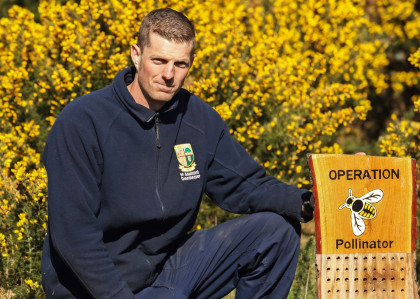
Syngenta Operation Pollinator Environmental Award Winner, Anthony Darker, hasn’t been resting on his laurels at Elsham Golf Club in Lincolnshire. He has continued to develop a whole range of eco projects that has served to further enhance the environmental value of the golf course in the area.
In addition to the wonderful wildflower areas that have been created for the benefit of players and pollinating insects, importantly Anthony has also been busy providing vital winter refuges – or hibernaculum – for the bees and bug life that has been attracted.
But with only a limited budget he’s been trying to come up with ways to create them by recycling materials laying around the yard: bricks; roof tiles; old wood and logs; even old hole cups and more have been cleverly utilised.
“Not only is it more cost effective, but reusing existing materials and supplies reduces waste and is a more ecological approach,” reported Anthony.
“I have the theory if every time you want to build a birdhouse you cut down a tree, eventually we won’t have any trees to put the house in!”
Anthony pointed out that though the year they end up with pallets from deliveries of turf, fertilisers and machine parts, which typically end up just getting in the way in a pile in the corner of the work shop, or used as fire wood.
“We have started to dismantle these pallets and reusing them for bee hibernaculum; be it a pallet stack filled with other recycled goods, or wall mounted hibernaculum on sides of sheds and out buildings.
“Log and brash piles in open south facing glades are incredibly attractive to a whole range of insects and other wildlife. And leaving standing dead wood is an excellent habitat too, since it blends into the surroundings and gives that more natural look.”
Syngenta Operation Pollinator Manager, Caroline Carroll, highlighted that there was still time to work on establishing valuable new ecological habitats around the golf course this autumn.
“Warm soil conditions and adequate moisture in September is ideal for sowing wildflower areas, either as stand-alone areas or as part of rough enhancement. Thick rough can be sprayed off now with Rescue, to remove coarse grasses and make space for finer fescues, as well as giving the wildflowers the room to establish,” she said. “The work at Elsham has ably demonstrated the immense benefit from enhancing the essential combination of food resources and nesting sites for pollinating insects.”
Anthony Darker added: “Syngenta Operation Pollinator workshops have demonstrated ways to manage and improve our out of play areas and make the golf course more wildlife friendly. I would urge all greenkeepers to take a look around their own work shop and club house, and see what they can come up with to get creative; the possibilities are endless to get involved and to do your bit.”
For turf specific information go to www.greencast.co.uk
Syngenta turf products are distributed in the UK and Ireland by Everris www.everris.co.uk
Read more stories about Golf Management Topics and latest list of Most-read stories

